J-pop, natively also known simply as pops, is a musical genre that entered the musical mainstream of Japan in the 1990s. Modern J-pop has its roots in traditional Japanese music, but significantly in 1960s pop and rock music, such as The Beatles and The Beach Boys, which led to Japanese rock bands such as Happy End fusing rock with Japanese music in the early 1970s. J-pop was further defined by new wave and crossover fusion acts of the late 1970s such as Yellow Magic Orchestra and Southern All Stars, then Eurobeat in the early 1990s, namely Namie Amuro.

GLAY is a Japanese rock band, formed in Hakodate in 1988. Glay primarily composes songs in the rock and pop genres, but they have also arranged songs using elements from a wide variety of genres, including progressive rock, punk, electronic, R&B, folk, gospel, reggae, and ska. Originally a visual kei band, the group slowly shifted to less dramatic attire through the years. As of 2008, Glay had sold an estimated 51 million records; 28 million singles and 23 million albums, making them one of the top ten best-selling artists of all time in Japan.
Kyosuke Himuro is a former Japanese musician and singer-songwriter. He was lead vocalist of the rock band Boøwy from 1981 to 1988. After the band disbanded he started a successful solo career, becoming one of Japan's best-selling artists. In 2003, HMV Japan ranked Himuro at number 76 on their list of the 100 most important Japanese pop acts. He currently lives in Los Angeles, California, where he purchased a 12,500 square feet palatial residence in Beverly Hills in 2004 for $6.4 million, which was previously owned by Shaquille O'Neal.
Orange Range are a 5-member Japanese rock band, based in Okinawa, Japan. Formed in 2001, the band began with Spice Music and later signed with Sony Music Japan's gr8! records division in 2003. The band left gr8! records in 2010 to start their own label, Super Echo. In 2012, they signed with Victor Entertainment's Speedstar Records label.

Hisashi Tonomura, better known by his stage name HISASHI, is a Japanese musician best known as the lead guitarist of the rock band Glay. He is particularly associated with the brand Tokai, designing a series of personal signature guitars, based on their Talbo model.
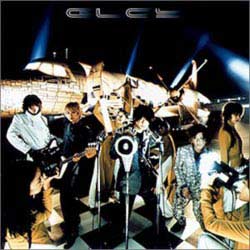
One Love is the seventh released album from the Japanese rock band Glay. This album is the first one to have song compositions from each member.

Drive: Glay Complete Best is the second "greatest hits" album by Japanese pop/rock band Glay. It is composed by some of Glay's most popular singles and album tracks from their debut in 1994 to 2000. The two discs each contain hits from albums Speed Pop to Heavy Gauge as well as various singles. The album peaked at #1 at Oricon charts and sold 2,637,420 according to the charts. The album was certified "Double Million" by the Recording Industry Association of Japan (RIAJ).
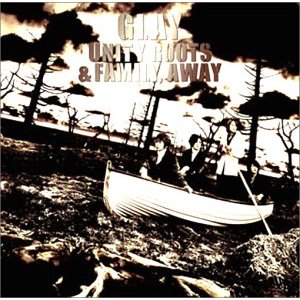
Unity Roots and Family, Away is the eighth released album from the Japanese rock band Glay. It reached #1 on Oricon charts and sold about 436,180 copies. In this album Glay takes a new turn and dabbles in genres such as gospel, R&B and blues. The band's leader, Takuro, wanted an album made for the people closest to him, which resulted in "UR&FA".

Glay Rare Collectives Vol. 1 and 2 are the third and fourth released collection albums from the Japanese rock band, Glay. Unlike Review and Drive: Glay Complete Best, these two double disc CDs feature all of the B sides from their singles that were released from their debut to "mata koko de aimashou" as well as some other songs originally used for different works and not featured in any of their albums or singles. The first volume features the original song "Shiawase ni naru, sono toki ni", while the second volume featured the then newly released song "Itsuka".

Pure Soul is the fifth released album from the Japanese rock band Glay. The album was a slight departure from the rock and power ballad sound the band sported with their previous albums. Pure Soul brought forth a faster alt-rock sound. The album contains such hits as "Yuuwaku", "Soul Love", the concert classic "I'm in Love", and the title track "Pure Soul". The album peaked at #1 on Oricon charts and sold about 2,430,000. It was certified "Triple million" by the Recording Industry Association of Japan (RIAJ).
"Misery" is the fifth single by Japanese musician hide, released on June 24, 1996. It reached number 3 on the Oricon chart. It was certified gold by RIAJ in July 1996. On May 2, 2007, the single was re-released with a slightly different cover. On August 4, 2010, it was re-released again as part of the second releases in "The Devolution Project", which was a release of hide's original eleven singles on picture disc vinyl.
The discography of Japanese pop rock band Glay consists of sixteen studio albums, forty-two unique singles, twenty-seven video albums, and sixty-four songs associated with various promotions.

F.T. Island, is a South Korean rock band formed by FNC Entertainment in 2007. The band currently consists of main vocalist Lee Hong-gi, bassist Lee Jae-jin, and drummer Choi Min-hwan. Guitarist Oh Won-bin left the band in 2009 and was replaced by Song Seung-hyun. Former leader Choi Jong-hoon left the band and retired from the entertainment industry on March 14, 2019, while Seung-hyun left the group on December 31, 2019, to pursue his acting career.
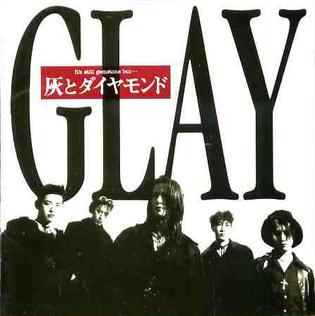
Hai to Diamond is the debut album by Japanese rock band Glay. It was released on May 25, 1994 on the independent label Extasy Records and peaked at #26 on the Oricon chart, with more than 100,000 copies sold.

Kiyoshiro Imawano, born Kiyoshi Kurihara, was a Japanese rock musician, lyricist, composer, musical producer, and actor from Tokyo, Japan. He was dubbed "Japan's King of Rock". He formed and led the influential rock band RC Succession. He wrote many anti-nuclear songs following the Chernobyl disaster in 1986. He was known for pioneering the adoption of linguistic characteristics of the Japanese language into his songs.
"Winter, Again" is the 16th single by Japanese band Glay. It reached #1 on the weekly Oricon charts and sold 1,638,120 copies in 1999, becoming the #2 single of the year. It charted for 18 weeks and sold a total of 1,642,530 copies, becoming Glay's best selling single. The title song was used as the East Japan Railway "SKI SKI" CM song.
The Great Vacation Vol.2: Super Best of Glay is a compilation album by Japanese band Glay, released on October 21, 2009. It reached #1 at Billboard Japan Top Albums chart and #1 on Oricon charts, selling sold 187,732 copies. It was certified gold for shipment of over 100,000 copies.
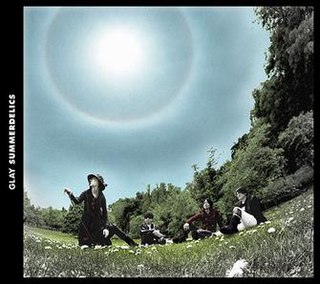
Summerdelics is the fourteenth studio album by Japanese pop rock band Glay, released on July 12, 2017. It was released in three versions: the regular edition with the album, a special edition with the album and two live DVDs, and another special edition with the album, four live albums and three blue rays.
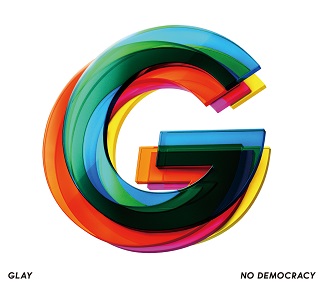
No Democracy is the fifteenth studio album by Japanese pop rock band Glay, released on 2 October 2019.

"Happiness" is a song written and recorded by Japanese-American singer-songwriter Ai. Originally released digitally on November 18, 2011 as the second single from Ai's ninth studio album, Independent, it was released physically on December 14, 2011 by EMI Music Japan alongside "Letter in the Sky".













